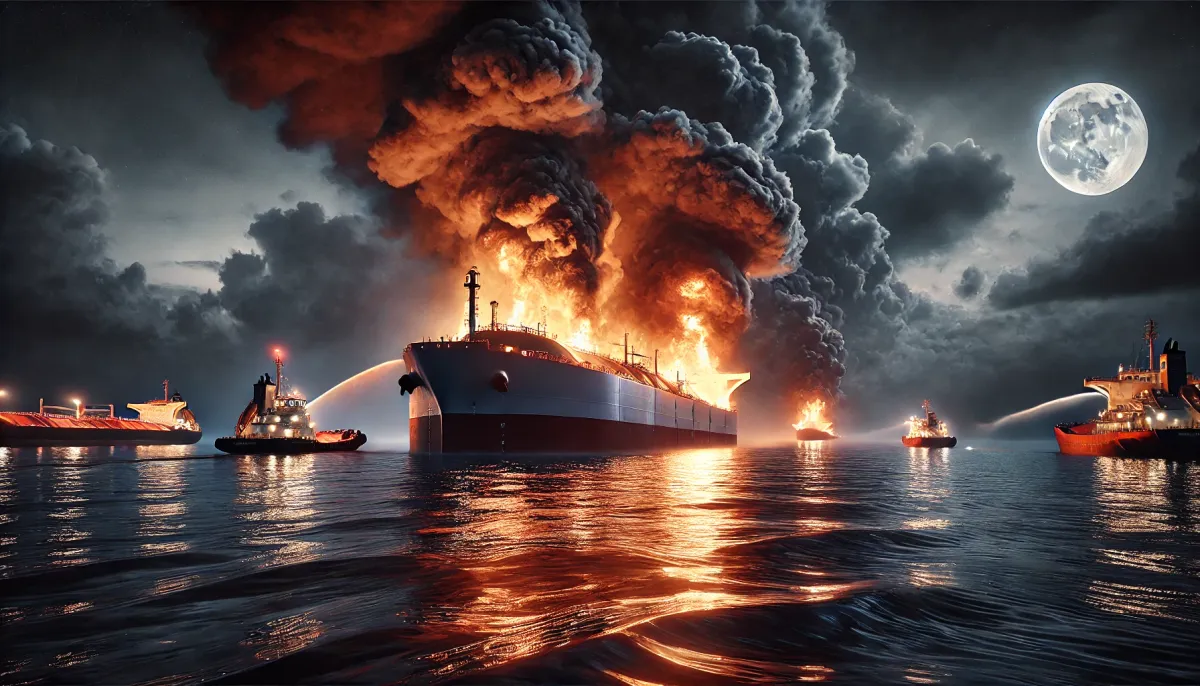Two LPG Carriers Catch Fire During Ship-to-Ship Transfer off Chittagong: An In-Depth Report

In a dramatic and potentially devastating incident, a fire broke out early Sunday morning during an allegedly unauthorized ship-to-ship (STS) transfer operation involving two LPG carriers off the coast of Chittagong, Bangladesh. The vessels involved were the Captain Nikolas and the lighterage vessel B-LPG Sophia, and while no lives were lost, the incident has raised significant concerns about maritime safety, regulatory compliance, and possible sanctions violations.
Incident Overview
The Captain Nikolas was anchored off Kutubdia Island, Chattogram, over the weekend to transfer cargo to the smaller vessel B-LPG Sophia. The operation, which commenced at midnight, took a dangerous turn at approximately 12:45 AM when a fire erupted aboard both vessels during the cargo transfer.
The Bangladesh Coast Guard, together with the Navy, dispatched a total of seven vessels to the scene to contain the blaze. Fortunately, they were able to bring the fire under control before it spread further, preventing an environmental catastrophe.
In the chaos that ensued, 31 crewmembers jumped into the sea to escape the flames. Quick rescue efforts ensured that all crew members were safely recovered, and no significant injuries were reported.
A terrible fire broke out in an oil tanker in Chittagong.
— United Marine Engineering & Electrical Works (@marine_wor9861) September 30, 2024
An oil tanker called 'Banglar Jyoti' caught fire at Dolphin Jetty in the Karnaphuli River in Chittagong. Eight fire service units are working to control the fire.#safety #fire #seftyalert #marine #chittagong #cargohold pic.twitter.com/Jirizuc1yZ
Damage Assessment and Initial Findings
According to New Age Bangladesh, the Captain Nikolas managed to escape serious damage, but the B-LPG Sophia sustained substantial structural losses. Initial reports suggest that cargo transfer procedures might have been compromised, and questions are now being raised about whether the cargo origin was properly declared.
The LPG Operators Association of Bangladesh (LOAB) has alleged that the cargo carried aboard the Captain Nikolas may have been illegally sourced from Iran, a country currently facing international sanctions.
Authorities Respond and Launch Investigation
Mohd Omar Faruk, Secretary of the Chittagong Port Authority (CPA), has confirmed that officials boarded the Captain Nikolas and found no direct evidence of illicit cargo. Documentation presented by the crew indicated that the vessel loaded its LPG cargo in Dubai or Oman.
However, in light of the allegations, the CPA has established an investigative committee with a strict one-week deadline to determine the cause of the fire and assess compliance with international shipping regulations.
Vessel History and Safety Concerns
The Captain Nikolas is a 50,000 deadweight tonnage (dwt) LPG carrier, built in 1992 and currently flying the flag of the Cook Islands. This vessel has a history of safety issues, having been detained in Hunen, China, earlier this year for fire protection violations on the cargo deck. The same issues were cited again upon its return to Hunen in March 2024, raising questions about the adequacy of the ship’s fire prevention measures.
This incident is not an isolated occurrence. It marks the third and fourth major maritime fires in Bangladeshi waters in the past two weeks. On October 4, a fire erupted aboard the tanker Banglar Shourabh, resulting in the tragic death of one crewmember. Just days earlier, on September 30, a fire aboard the tanker Banglar Jyoti claimed the lives of three crewmembers.
The frequency of these incidents has sparked widespread concerns over safety standards in Bangladesh’s shipping sector, with stakeholders calling for stricter oversight and enforcement of maritime safety protocols.
Impact and Broader Implications
While the immediate crisis has been contained, the incident could have far-reaching consequences. If the allegations of cargo misdeclaration are confirmed, both the vessel operator and the involved parties could face severe penalties for violating international sanctions. The Bangladesh government is now under pressure to enhance monitoring of ship-to-ship transfers and enforce stricter safety protocols.
The fire aboard Captain Nikolas also casts a spotlight on the risks associated with older vessels, particularly those with documented safety deficiencies. As the maritime community reflects on these recent events, there is a renewed focus on improving safety training, ensuring regulatory compliance, and preventing future tragedies in the region’s busy maritime corridors.
Conclusion
The maritime industry is once again reminded of the importance of stringent safety measures and regulatory compliance, especially during high-risk operations such as ship-to-ship transfers. As the investigation unfolds, authorities are expected to provide more clarity on the underlying causes of this incident. In the meantime, industry leaders and regulatory bodies must act swiftly to prevent further disasters and restore trust in Bangladesh’s maritime operations.
This incident not only highlights operational challenges but also serves as a call to action for strengthening maritime safety and regulatory frameworks.
Stay tuned for further updates as the Chittagong Port Authority releases the findings of its investigation.